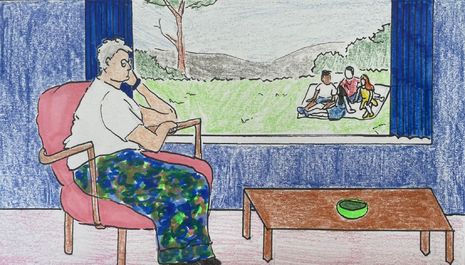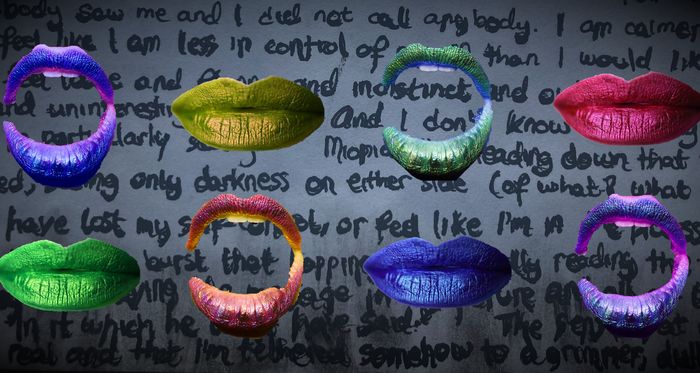I want to be old and socially tolerated
Sionna Hurley-O’Kelly explores societal expectations, social faux-pas and self-confidence as she aspires to be unconcerned by the opinions of others

I have a new theory. After 22 years as a failing conversationalist, I’ve concluded that my best chance of social success lies in brevity.
It’s an established fact that I have only a limited supply of pithy comments and sagacious remarks. Give me infinite time and I start committing all manner of social faux pas. It’s regrettable in the moment, and even more so the next morning. Or, as an equally unattractive alternative, I become utterly silent. Not silent in a wistful yet dignified way. Not silent in a way that suggests the contemplation of profound and genuinely original perspectives on the human condition. But silent in such a manner as bespeaks a sudden and uncomfortable awareness of one’s own eyeballs and their unhappy capacity to make eye contact with other people. Silent in a way that kills a conversation faster than the claim that “you’ve recently been injured in an accident which wasn’t your fault.” The unfortunate truth of it is, I go stale very quickly.
“I nurture an unhappy and generally unhelpful tendency to analyse my interactions at length”
Conveniently, this new theory coincides with another development in my life. The recent acquisition of contact lenses, procured in an optimistic attempt to remodel myself as ‘Parisian Chic’, has given me an excellent excuse for abridging social engagements. “Do you have the time? – Ten past nine, you say? – Goodness! My lenses have been in for nearly twelve hours! I must be off post-haste!” And just like that, I can escape the shame I’m about to bring down on my head, or curtail my existing mortification so that it is, if not painless, at the very least swift. Myopia finally proves useful in ways other than allowing me claim to see life through the artistic vision of Monet.
So, lenses offer me an escape route from the embarrassed repentance which evolves, with monkey-and-typewriter levels of inevitability, from prolonged social engagement. I nurture an unhappy and generally unhelpful tendency to analyse my interactions at length. Over and over I rewatch myself acting oddly to outright hysterically, as if attempting to acclimatise to my own unattractiveness. My anecdote fell flat. I overshared. I insulted a friend. I insulted an entire nation. I seemed pathetic. I seemed hyperbolic. I cut someone off. I sang Elton John. I rewatch myself sit silently in a kitchen chair that’s set slightly too low to flatter my unusually short torso, while the group around me discusses recent TikTok trends with ever more theatrical impressions of dopamine-operated teenagers.
“I want to possess that capacity for true, unqualified nonchalance towards self-presentation which seems to appear most frequently in the elderly”
At last, I pick up a line of conversation to which I can contribute – “Yes! I’ve seen William Shatner’s reading of Rocket Man. His intonation perfectly resembled that of a bullfrog, don’t you think?” My comment is met with less appreciation than I’d hoped for. Someone tries to redirect the conversation. But I’ve landed on something I can talk about, and I’m keen to salvage my attempt at engagement: I interrupt them – “Mars ain’t the kind of place to raise your kids.” A few people stare at me for a moment, perhaps out of politeness, but the group’s attention turns quickly back to the dance routines of Generation Alpha. I leave the kitchen soon after, though not before inadvertently offending the crème brûlée.
This compulsive tendency to evaluate social interactions derives from a fundamental concern for how I’m seen by others. Self-hatred in its proper sense is a bygone hobby of mine – in the most new-age-self-help-book of ways, I now accept my flaws and forgive my mistakes. Yet in spite of this acceptance, I still care about how others see me. When dialogues go awry or interactions flop, I’m left with the vague sense of having betrayed some sort of “true self” – one that’s infinitely cooler and more impressive than the incoherent persona I’ve been putting across. And of course, the more I care what people think, the more ridiculously I act, as I grope around, sans spectacles, for those interesting anecdotes and well-timed comments that will perfectly encapsulate my character.
I want to stop caring about all this. I want to possess that capacity for true, unqualified nonchalance towards self-presentation which seems to appear most frequently in the elderly: the grandparents who chuckle away at their own jokes over a glass of sherry, the retirees who sell their houses to join the Hell’s Angels and grow mohawks. I want to be the sort of senior citizen who happily spouts my opinions and makes self-satisfying jokes and recounts at length my tales of yore with a verbosity that nearly extinguishes the listeners, but nobody can get rid of me because I’m old and played by Maggie Smith. I’d like to be able to say “take me or leave me” and really mean it, cheerfully avoiding any major moral infractions while maintaining an otherwise effortless air of unconcern. And sometimes I can. There are periods when I become more self-contained. At these points I’m perfectly happy spending my time on long, secluded walks and drifting in and out of company with little concern for how I’m perceived.
But this state never lasts. Eventually, something changes – I become closely bound up in a social circle, or a criticism hits hard, or somebody comes along whom I emphatically, inescapably want to impress. And once again, as unwise as it is, I find myself at the mercy of other people’s impressions.
 Features / How sweet is the en-suite deal?13 January 2026
Features / How sweet is the en-suite deal?13 January 2026 Comment / Will the town and gown divide ever truly be resolved?12 January 2026
Comment / Will the town and gown divide ever truly be resolved?12 January 2026 News / 20 vet organisations sign letter backing Cam vet course13 January 2026
News / 20 vet organisations sign letter backing Cam vet course13 January 2026 Arts / Fact-checking R.F. Kuang’s Katabasis13 January 2026
Arts / Fact-checking R.F. Kuang’s Katabasis13 January 2026 Music / Inside Radiohead’s circle13 January 2026
Music / Inside Radiohead’s circle13 January 2026









